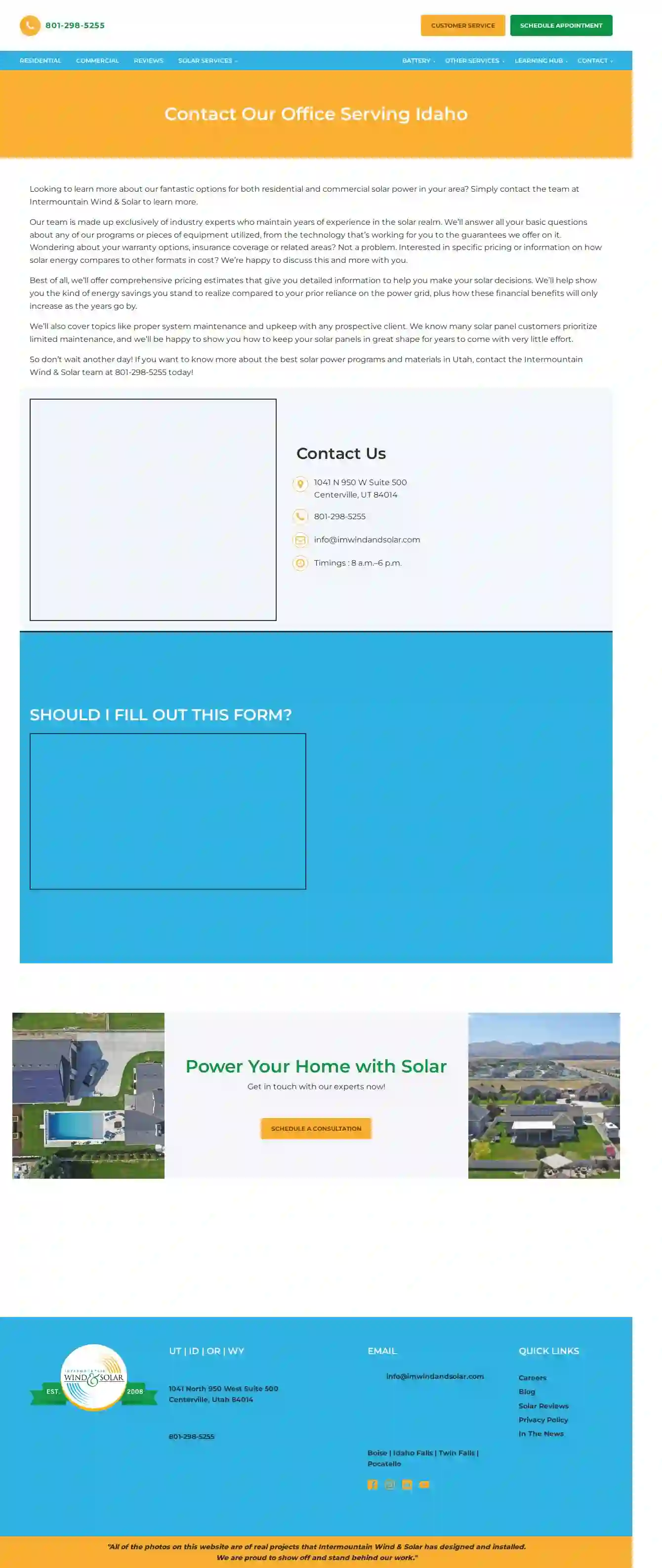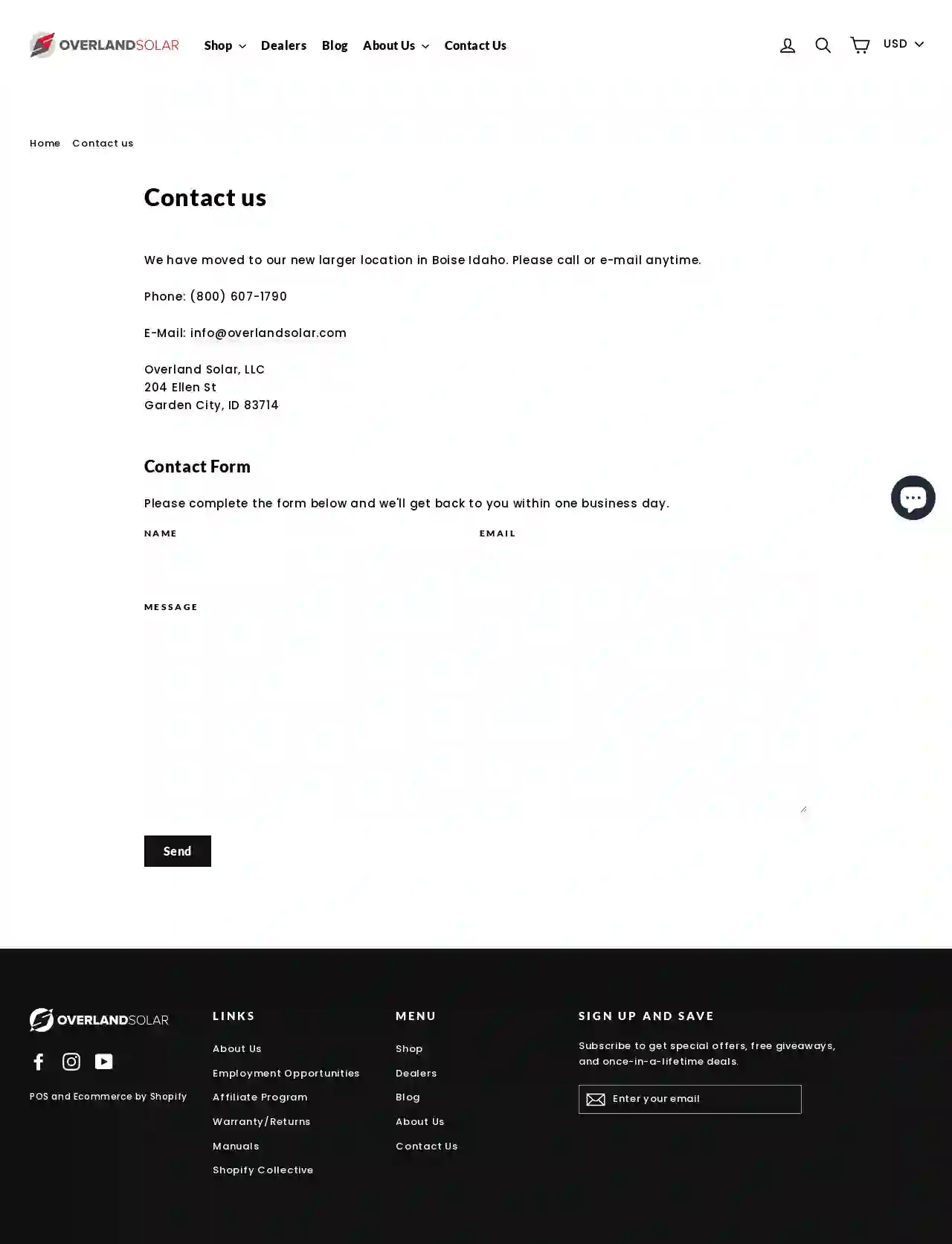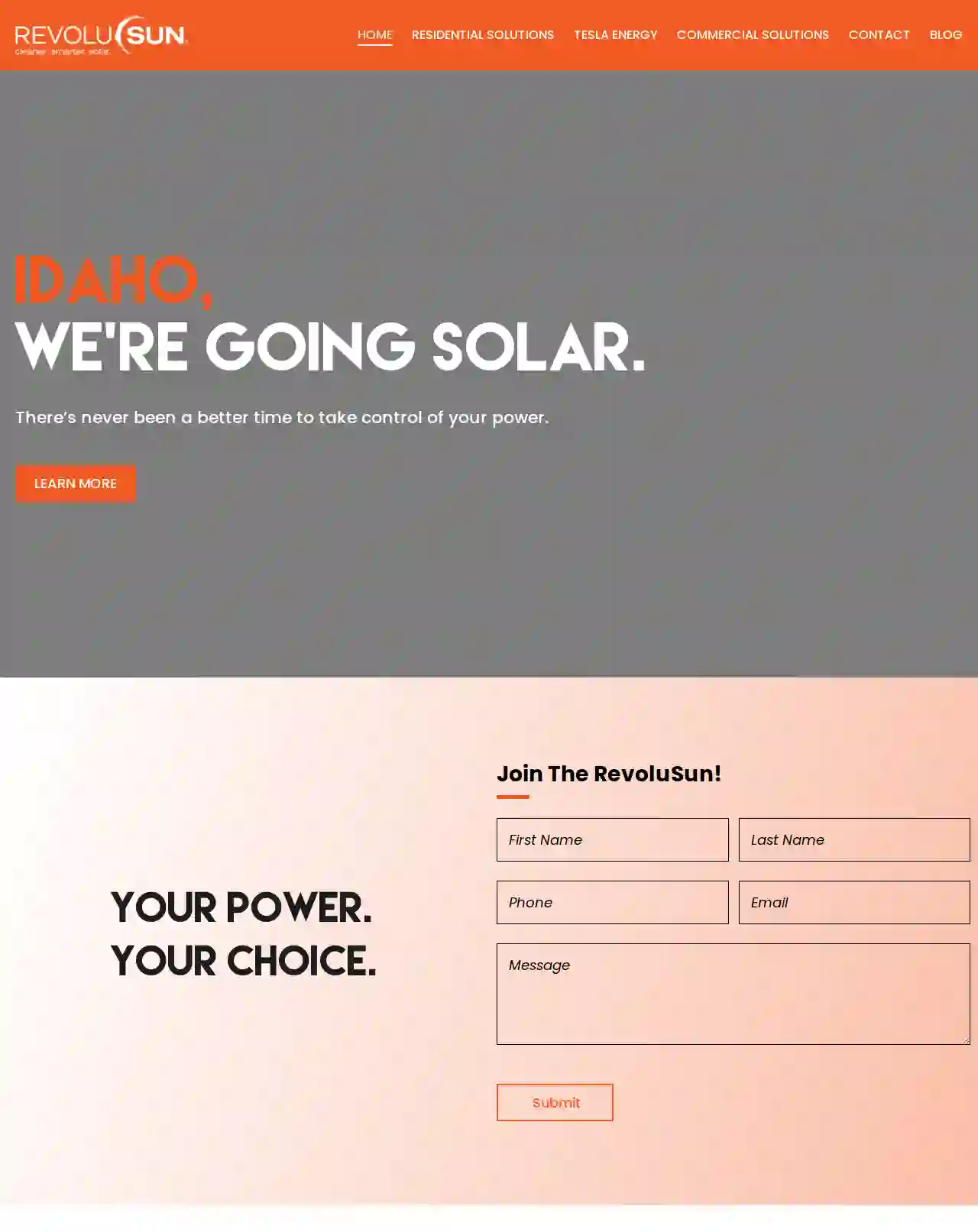Commercial Solar Installers Boise
Find the best Commercial Solar Company in Boise
Receive 3 FREE Solar Panels For Businesses quotes for your project today! Compare profiles, reviews, accreditations, portfolio, etc... and choose the best offer.

Intermountain Wind & Solar
3.625 reviews1041 North 950 West Suite 500, Centerville, 84014, USIntermountain Wind & Solar is a leading provider of solar power solutions for both residential and commercial clients. With a team of industry experts, they offer comprehensive services including installation, maintenance, and education on solar energy. Their commitment to customer satisfaction and environmental sustainability sets them apart in the industry.
- Services
- Why Us?
- Accreditations
- Our Team
- Testimonials
- Gallery
Get Quote
Idaho County Solar
Stites, ID, 209 Harpster Dr., 83552, USIdaho County Solar is a leading solar energy solutions provider in North Central Idaho, focusing on Idaho County, McCall, Ketchum, Sun Valley, Treasure Valley, and Garden Valley. With over four decades of experience, they offer comprehensive services including solar package installation, consultation, battery replacement, and special services for unique locations such as yurts, island residences, and off-grid mountain cabins. Their commitment to sustainability, effectiveness, and customer satisfaction sets them apart.
- Services
- Why Us?
- Accreditations
- Our Team
- Testimonials
- Gallery
Get Quote
Boise Solar
519 reviews13601 W. Mcmillian Rd, Ste. #102 #267, Boise, 83713, USBoise Solar is a locally-owned, family-operated business dedicated to providing Idaho with the finest solar service and empowering homeowners with clean, renewable energy benefits. Our journey began in 2014 when our founder, Paul, entered the solar industry. After gaining experience with various solar companies in Idaho, he recognized a crucial need for exceptional customer service, precise installations, and top-quality components with reliable warranties. Driven by these principles, Boise Solar was established.
- Services
- Why Us?
- Testimonials
- Gallery
Get Quote
Comet Energy
543 reviewsStar, ID, 123 Solar Lane, 83669, USComet Energy is a local solar installer based in Boise and Idaho, aiming to energize homes, businesses, and the ecosystem for a better tomorrow. With over 22 years of experience in the solar energy industry, they have built a clear line of communication between the sales and tech teams, ensuring top-quality service and installation. Their installers provide on-site consultations that best fit your home and provide dedicated time and high-quality work.
- Services
- Why Us?
- Accreditations
- Our Team
- Testimonials
- Gallery
Get Quote
Solar Tools USA
55 reviews123 Solar Way, Suite 100, Meridian, 83642, USSolar Tools USA is a company dedicated to providing the solar industry with specialized tools. Their mission is to offer high-quality, innovative products that make the installation process easier and safer for professionals. They believe in the importance of proper training and have contributed to articles discussing the evolution of the solar industry and tips for installers.
- Services
- Why Us?
- Accreditations
- Our Team
- Testimonials
- Gallery
Get Quote
Renewable Energy NW LLC
4.36 reviews123 Main St, Suite 101, Boise, 83701, USRenewable Energy NW LLC is a Idaho based company with a focus on helping people in the Pacific Northwest achieve balance and sustainability while improving their cost of energy. We are committed to promoting sustainability and making it accessible to everyone.
- Services
- Why Us?
- Accreditations
- Our Team
- Testimonials
- Gallery
Get Quote
Overland Solar
4.47 reviewsGarden City, ID, 204 Ellen St, Boise, 83714, USOverland Solar was the result of meeting hundreds of like-minded travellers who kept encountering the same problem: an inefficient and unreliable power supply on the go. We noticed a lack of engineering in these power systems. Most RVs are meant to be 'plugged-in' at a campground. For those of us who detest vacationing in rows of RVs, there had to be a better way to keep the lights on. We wanted to bring you a system that was portable, efficient, easy to use, and cost effective. After many nights of research and prototypes, we're proud to give you exactly that. No more overpriced and underperforming power systems. No more drilling or specialized electrical installation. This is Overland Solar. Endless power and freedom.
- Services
- Why Us?
- Accreditations
- Our Team
- Testimonials
- Gallery
Get Quote
idaho goes solar
123 Solar Lane, Boise, ID, 83701, USIdaho Goes Solar is a local business that specializes in providing solar energy solutions to homeowners. They offer a range of services including solar panel installation, energy independence, and financial incentives such as rebates and tax credits. Their mission is to help homeowners reduce their reliance on the grid and save money on their utility bills. They provide a comprehensive process that includes a savings report, document preparation, site survey, CAD/permit, installation, and system activation.
- Services
- Why Us?
- Accreditations
- Our Team
- Testimonials
- Gallery
Get Quote
North Idaho Solar Company
123 Solar Lane, Coeur d'Alene, 83814, USNorth Idaho Solar Co. is a locally owned and operated solar company based in beautiful Kootenai County. Our team of dedicated professionals is passionate about helping our customers harness the power of the sun. Our goal is to offer the highest quality service possible to meet your solar needs. We believe that going solar is an investment in your future, and we are committed to making that investment a smooth and enjoyable process for every customer.
- Services
- Why Us?
- Accreditations
- Our Team
- Testimonials
- Gallery
Get Quote
RevoluSun Idaho
4.935 reviews457 N Steelhead Way, Boise, 83704, USRevoluSun Mountain States, LLC is a locally owned solar company that is proud to serve our customers the highest quality products and service in solar and energy storage.
- Services
- Why Us?
- Accreditations
- Gallery
Get Quote
Over 4,210+ Solar Installers on our platform
Our solar contractors operate in Boise & surroundings!
SolarCompaniesHub has curated and vetted Top Solar Installers near Boise. Find the most trustworthy business today.
Frequently Asked Questions About Commercial Solar Installations
- You pay a fixed monthly lease payment for the use of the solar system.
- You do not own the system.
- You are responsible for maintenance and repairs.
- You typically do not benefit from tax incentives or depreciation.
- You purchase the electricity generated by the solar system at a fixed rate per kilowatt-hour (kWh).
- You do not own the system.
- The third-party owner is responsible for maintenance and repairs.
- You may not be eligible for all tax benefits.
- System Size (kW): Larger systems generally cost more.
- Type of Solar Panels: Higher-efficiency panels can have a higher upfront cost but may generate more energy over time.
- Roof Complexity: Complex roofs (e.g., multiple angles, obstructions) may require more labor and specialized mounting hardware, increasing costs.
- Labor Costs: Labor rates vary by location.
- Permitting and Interconnection Fees: Costs for permits, inspections, and connecting to the grid can vary.
- Available Incentives: Tax credits, rebates, and other incentives can significantly reduce the overall cost.
What is the lifespan of a commercial solar system?
How do solar panels affect my building's insurance?
What is the difference between a solar lease and a PPA?
Solar Lease:
PPA:
How much does a commercial solar system cost?
What is the lifespan of a commercial solar system?
How do solar panels affect my building's insurance?
What is the difference between a solar lease and a PPA?
Solar Lease:
- You pay a fixed monthly lease payment for the use of the solar system.
- You do not own the system.
- You are responsible for maintenance and repairs.
- You typically do not benefit from tax incentives or depreciation.
PPA:
- You purchase the electricity generated by the solar system at a fixed rate per kilowatt-hour (kWh).
- You do not own the system.
- The third-party owner is responsible for maintenance and repairs.
- You may not be eligible for all tax benefits.
How much does a commercial solar system cost?
- System Size (kW): Larger systems generally cost more.
- Type of Solar Panels: Higher-efficiency panels can have a higher upfront cost but may generate more energy over time.
- Roof Complexity: Complex roofs (e.g., multiple angles, obstructions) may require more labor and specialized mounting hardware, increasing costs.
- Labor Costs: Labor rates vary by location.
- Permitting and Interconnection Fees: Costs for permits, inspections, and connecting to the grid can vary.
- Available Incentives: Tax credits, rebates, and other incentives can significantly reduce the overall cost.